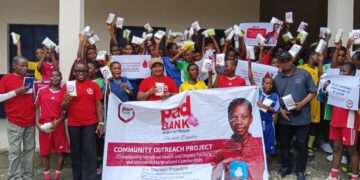By Asuquo Cletus
PadBank Mobile Outreach has called for stronger investment in the safety, dignity, and wellbeing of young girls as the world marks the commencement of the 2025 International 16 Days of Activism Against Gender-Based Violence.
The group made the call on Tuesday in a statement signed by its Founder and Coordinator, Archibong Bassey, stressing that menstrual poverty remains one of the silent drivers of vulnerability, stigma, and exploitation among girls in underserved communities.
Bassey noted that while gender-based violence is often understood as physical or sexual harm, many girls also suffer social and economic forms of abuse rooted in a lack of access to basic menstrual hygiene products.
According to her, hundreds of girls across rural communities in Cross River State continue to face mockery, discrimination, and emotional trauma because they cannot afford sanitary pads. He added that some resort to unsafe alternatives, exposing them to health risks and exploitation.
“This year’s theme, ‘UNiTE! Invest to Prevent Violence Against Women & Girls,’ speaks directly to our mission,” the statement read. “Access to menstrual products is not a luxury but a right. Providing pads, education, and psychosocial support is a crucial investment in the dignity and safety of girls.”
The group reaffirmed its commitment to reaching vulnerable girls in hard-to-reach areas, offering menstrual health education, and creating safe spaces for them to speak and learn without fear.
PadBank also urged government agencies, NGOs, faith leaders, and community stakeholders to support ongoing efforts to protect girls from abuse and end harmful cultural practices tied to shame and stigma.
“Ending gender-based violence is a collective responsibility,” Bassey said. “Every act of support brings us closer to a society where girls are protected, valued, and respected.”
Primetime gathered that PadBank Mobile Outreach has continued to champion menstrual health rights and dignity for young girls, especially in rural communities where access to sanitary products remains limited.












